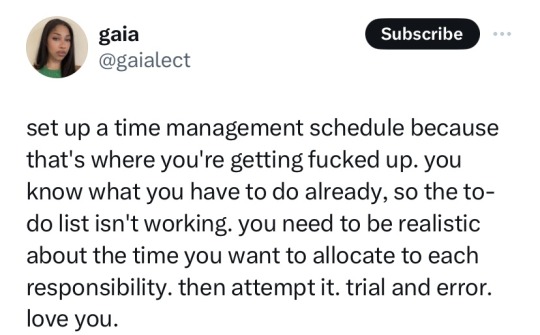#Organization
Text
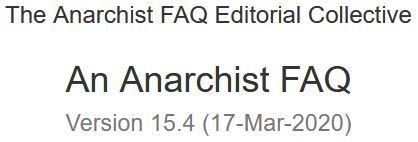
A.2.8 Is it possible to be an anarchist without opposing hierarchy?
No. We have seen that anarchists abhor authoritarianism. But if one is an anti-authoritarian, one must oppose all hierarchical institutions, since they embody the principle of authority. For, as Emma Goldman argued, “it is not only government in the sense of the state which is destructive of every individual value and quality. It is the whole complex authority and institutional domination which strangles life. It is the superstition, myth, pretence, evasions, and subservience which support authority and institutional domination.” [Red Emma Speaks, p. 435] This means that “there is and will always be a need to discover and overcome structures of hierarchy, authority and domination and constraints on freedom: slavery, wage-slavery [i.e. capitalism], racism, sexism, authoritarian schools, etc.” [Noam Chomsky, Language and Politics, p. 364]
Thus the consistent anarchist must oppose hierarchical relationships as well as the state. Whether economic, social or political, to be an anarchist means to oppose hierarchy. The argument for this (if anybody needs one) is as follows:
“All authoritarian institutions are organised as pyramids: the state, the private or public corporation, the army, the police, the church, the university, the hospital: they are all pyramidal structures with a small group of decision-makers at the top and a broad base of people whose decisions are made for them at the bottom. Anarchism does not demand the changing of labels on the layers, it doesn’t want different people on top, it wants us to clamber out from underneath.” [Colin Ward, Anarchy in Action, p. 22]
Hierarchies “share a common feature: they are organised systems of command and obedience” and so anarchists seek “to eliminate hierarchy per se, not simply replace one form of hierarchy with another.” [Bookchin, The Ecology of Freedom, p. 27] A hierarchy is a pyramidally-structured organisation composed of a series of grades, ranks, or offices of increasing power, prestige, and (usually) remuneration. Scholars who have investigated the hierarchical form have found that the two primary principles it embodies are domination and exploitation. For example, in his classic article “What Do Bosses Do?” (Review of Radical Political Economy, Vol. 6, No. 2), a study of the modern factory, Steven Marglin found that the main function of the corporate hierarchy is not greater productive efficiency (as capitalists claim), but greater control over workers, the purpose of such control being more effective exploitation.
Control in a hierarchy is maintained by coercion, that is, by the threat of negative sanctions of one kind or another: physical, economic, psychological, social, etc. Such control, including the repression of dissent and rebellion, therefore necessitates centralisation: a set of power relations in which the greatest control is exercised by the few at the top (particularly the head of the organisation), while those in the middle ranks have much less control and the many at the bottom have virtually none.
Since domination, coercion, and centralisation are essential features of authoritarianism, and as those features are embodied in hierarchies, all hierarchical institutions are authoritarian. Moreover, for anarchists, any organisation marked by hierarchy, centralism and authoritarianism is state-like, or “statist.” And as anarchists oppose both the state and authoritarian relations, anyone who does not seek to dismantle all forms of hierarchy cannot be called an anarchist. This applies to capitalist firms. As Noam Chomsky points out, the structure of the capitalist firm is extremely hierarchical, indeed fascist, in nature:
“a fascist system… [is] absolutist — power goes from top down … the ideal state is top down control with the public essentially following orders.
“Let’s take a look at a corporation… [I]f you look at what they are, power goes strictly top down, from the board of directors to managers to lower managers to ultimately the people on the shop floor, typing messages, and so on. There’s no flow of power or planning from the bottom up. People can disrupt and make suggestions, but the same is true of a slave society. The structure of power is linear, from the top down.” [Keeping the Rabble in Line, p. 237]
David Deleon indicates these similarities between the company and the state well when he writes:
“Most factories are like military dictatorships. Those at the bottom are privates, the supervisors are sergeants, and on up through the hierarchy. The organisation can dictate everything from our clothing and hair style to how we spend a large portion of our lives, during work. It can compel overtime; it can require us to see a company doctor if we have a medical complaint; it can forbid us free time to engage in political activity; it can suppress freedom of speech, press and assembly — it can use ID cards and armed security police, along with closed-circuit TVs to watch us; it can punish dissenters with ‘disciplinary layoffs’ (as GM calls them), or it can fire us. We are forced, by circumstances, to accept much of this, or join the millions of unemployed… In almost every job, we have only the ‘right’ to quit. Major decisions are made at the top and we are expected to obey, whether we work in an ivory tower or a mine shaft.” [“For Democracy Where We Work: A rationale for social self-management”, Reinventing Anarchy, Again, Howard J. Ehrlich (ed.), pp. 193–4]
Thus the consistent anarchist must oppose hierarchy in all its forms, including the capitalist firm. Not to do so is to support archy — which an anarchist, by definition, cannot do. In other words, for anarchists, ”[p]romises to obey, contracts of (wage) slavery, agreements requiring the acceptance of a subordinate status, are all illegitimate because they do restrict and restrain individual autonomy.” [Robert Graham, “The Anarchist Contract, Reinventing Anarchy, Again, Howard J. Ehrlich (ed.), p. 77] Hierarchy, therefore, is against the basic principles which drive anarchism. It denies what makes us human and “divest[s] the personality of its most integral traits; it denies the very notion that the individual is competent to deal not only with the management of his or her personal life but with its most important context: the social context.” [Murray Bookchin, Op. Cit., p. 202]
Some argue that as long as an association is voluntary, whether it has a hierarchical structure is irrelevant. Anarchists disagree. This is for two reasons. Firstly, under capitalism workers are driven by economic necessity to sell their labour (and so liberty) to those who own the means of life. This process re-enforces the economic conditions workers face by creating “massive disparities in wealth … [as] workers… sell their labour to the capitalist at a price which does not reflect its real value.” Therefore:
“To portray the parties to an employment contract, for example, as free and equal to each other is to ignore the serious inequality of bargaining power which exists between the worker and the employer. To then go on to portray the relationship of subordination and exploitation which naturally results as the epitome of freedom is to make a mockery of both individual liberty and social justice.” [Robert Graham, Op. Cit., p. 70]
It is for this reason that anarchists support collective action and organisation: it increases the bargaining power of working people and allows them to assert their autonomy (see section J).
Secondly, if we take the key element as being whether an association is voluntary or not we would have to argue that the current state system must be considered as “anarchy.” In a modern democracy no one forces an individual to live in a specific state. We are free to leave and go somewhere else. By ignoring the hierarchical nature of an association, you can end up supporting organisations based upon the denial of freedom (including capitalist companies, the armed forces, states even) all because they are “voluntary.” As Bob Black argues, ”[t]o demonise state authoritarianism while ignoring identical albeit contract-consecrated subservient arrangements in the large-scale corporations which control the world economy is fetishism at its worst.” [The Libertarian as Conservative, The Abolition of Work and other essays, p. 142] Anarchy is more than being free to pick a master.
Therefore opposition to hierarchy is a key anarchist position, otherwise you just become a “voluntary archist” — which is hardly anarchistic. For more on this see section A.2.14 ( Why is voluntarism not enough?).
Anarchists argue that organisations do not need to be hierarchical, they can be based upon co-operation between equals who manage their own affairs directly. In this way we can do without hierarchical structures (i.e. the delegation of power in the hands of a few). Only when an association is self-managed by its members can it be considered truly anarchistic.
We are sorry to belabour this point, but some capitalist apologists, apparently wanting to appropriate the “anarchist” name because of its association with freedom, have recently claimed that one can be both a capitalist and an anarchist at the same time (as in so-called “anarcho” capitalism). It should now be clear that since capitalism is based on hierarchy (not to mention statism and exploitation), “anarcho”-capitalism is a contradiction in terms. (For more on this, see Section F)
#faq#anarchy faq#revolution#anarchism#daily posts#communism#anti capitalist#anti capitalism#late stage capitalism#organization#grassroots#grass roots#anarchists#libraries#leftism#social issues#economy#economics#climate change#climate crisis#climate#ecology#anarchy works#environmentalism#environment#solarpunk#anti colonialism#mutual aid#cops#police
24 notes
·
View notes
Text
How to Stop Procrastinating by Managing Your Emotions
Procrastination happens when we delay doing things, and it's often connected to our emotions. Feelings like being afraid to fail, feeling worried or stressed, getting bored, or lacking motivation can all contribute to procrastination. To stop procrastinating and get more things done, it's important to learn how to handle our emotions better.
Boredom:
Break the task into smaller, more engaging sub-tasks.
Find ways to make the task more interesting or challenging.
Set a timer and work on the task for a specific amount of time, followed by a short break doing something enjoyable.
Feeling Overwhelmed:
Prioritize tasks and focus on one thing at a time.
Break the task into smaller, more manageable steps.
Delegate some parts of the task if possible or seek help from others.
Use tools like to-do lists or task management apps to stay organized.
Anxiety:
Practice deep breathing or mindfulness techniques to calm yourself.
Challenge negative thoughts and replace them with more positive and realistic ones.
Start with the easier or less intimidating aspects of the task to build momentum.
Set realistic expectations and remind yourself that it's okay to make mistakes.
Self-Doubt:
Focus on past accomplishments and successes to boost your confidence.
Seek support or feedback from others to gain reassurance.
Remind yourself of your skills and capabilities to tackle the task.
Use positive affirmations to counteract negative self-talk.
Perfectionism:
Embrace the concept of "good enough" rather than seeking perfection.
Set realistic and achievable goals for each task.
Recognize that mistakes and imperfections are part of the learning process and growth.
Indecisiveness:
Break decisions into smaller steps and make one small decision at a time.
Set a time limit for making decisions to avoid overthinking.
Trust your instincts and make the best decision you can with the information available.
Apathy or Lack of Interest:
Find aspects of the task that align with your values or long-term goals.
Break the task into smaller, more manageable parts and focus on completing one at a time.
Reward yourself for completing the task to make it more appealing.
Stress or Burnout:
Practice stress-reduction techniques such as meditation, exercise, or spending time in nature.
Break tasks into smaller steps to reduce the feeling of overwhelm.
Prioritize self-care and take breaks to avoid burnout.
Feeling Uninspired or Creatively Blocked:
Engage in activities that stimulate creativity, such as brainstorming, mind mapping, or seeking inspiration from others' work.
Start with a simple and basic version of the task to get the creative juices flowing.
Collaborate with others or seek feedback to gain new perspectives.
Fear of Success:
Identify and challenge the negative beliefs or fears that may be holding you back.
Visualize the positive outcomes of completing the task successfully.
Focus on the benefits and personal growth that come with success.
Impatience:
Break long-term goals into smaller milestones to track progress.
Practice mindfulness to stay present and patient throughout the process.
Remind yourself that progress takes time and effort.
Lack of Confidence:
Celebrate your past accomplishments to boost your confidence.
Seek support and encouragement from friends, family, or mentors.
Focus on building specific skills related to the task to increase confidence.
Avoiding Discomfort:
Acknowledge that discomfort is a natural part of growth and improvement.
Break tasks into smaller steps and tackle the more challenging aspects gradually.
Remind yourself of the long-term benefits of facing discomfort.
Overestimating Future Motivation:
Practice discipline and commit to starting tasks even when motivation is low.
Set specific deadlines for tasks to create a sense of urgency.
Establish a routine that includes regular work on the task to build consistency.
#discipline#motivationalquotes#motivateyourself#get motivated#organization#procrastination#emotional intelligence#self improvement#selfimprovement#self love#self development#personal improvement#personal growth#personal development#level up journey#success mindset#positive mindset#business mindset#goalsetting#life goals
8K notes
·
View notes
Text
getting seriously organized⋆.ೃ࿔*:・📄

the importance of organization - the nature of life is that it can seem really disorganized and chaotic but it doesn't absolutely have to be that way! organization helps to improve your efficiency and overall add structure to ur life.
agendas - a daily to do list is a MUST. i use notion to organize my time. i separate what i need to do into categories (A and B).

CATEGORY A ; tasks that hold the highest level of importance.
CATEGORY B ; tasks that are more simple (its not gonna nip u in the bud if u dont do a task in category b)
monthly calendars - monthly calendars are so helpful because i set new goals for every month, and when everything is already planned out and in front of you it makes it feel a million times easier to achieve those goals.
list important events
birthdays
appointments etc
lists - making lists is therapeutic for me at this point. its actually a lot of fun so i highly recommend it, but instead of just making lists for fun, you could make lists that'll be useful in the future. for example...
restock lists (lists of things that you consistently need and use)
grocery lists
meal prep - meal prep is so useful because it makes grocery shopping easier, and its easier to eat consistently when u know what ur going to eat
#advice#it girl#becoming that girl#that girl#it girl energy#honeytonedhottie⭐️#organization#self discipline#self development#self improvement#productivity#dream girl tips#dream girl#dream life#notion✍🏽🎀#pink academia#girl blog#girlblogging#calendars#planner#time management#self management
794 notes
·
View notes
Text
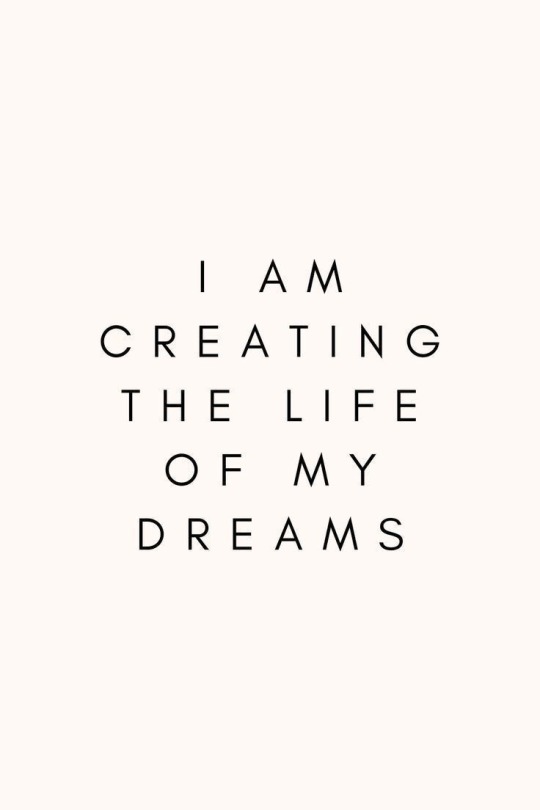



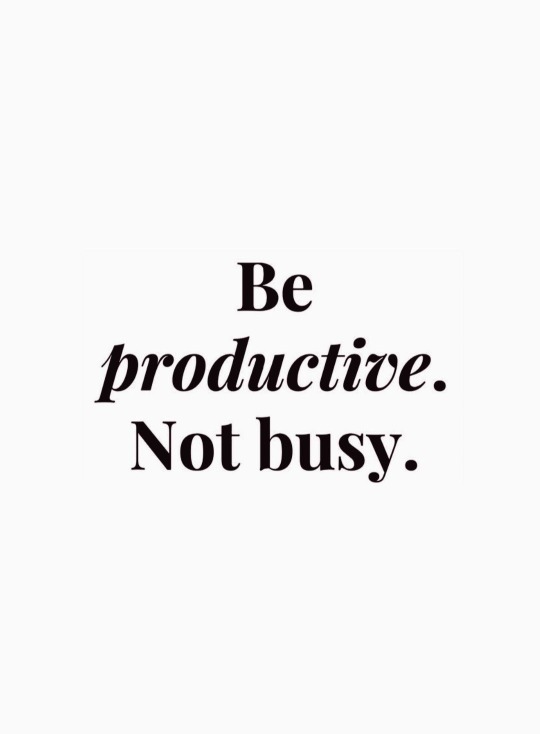




#feminine energy#leveled up mindset#luxury black women#black luxury#black femininity#black girl luxury#soft moodboard#black girl moodboard#moodboard#organization#high maintenance#luxury#rich black girls#soft black women#career development#career journey
420 notes
·
View notes
Text
Can't overemphasize how useful it is to own multiples of important things.
Deodorant? One in the bathroom and one in my closet, because those are the places I'm most likely to be naked and remember I need it. Lotion? One in the bathroom and one next to my bed, also because those are the places I remember it. I keep an air freshener in the bathroom and another one next to the place where I air out my sweaty work clothes.
I have one inhaler in my backpack, one in my car, and one in my leg bag. Hair clips, headbands, and hair ties? Some on the wall hooks in my room, others looped around the car gearshift. Teriyaki sauce? A bottle in the kitchen fridge, and packets in my room in case I forget the bottle.
Yeah it's redundant, but I promise that the two-pack of deodorant "costs" less to me than spending a day sticky and damp. It isn't wasteful if the system makes you use the thing. Even the bowl on my desk for pocket stuff (knife phone wallet keys) has a spare car key in case I misplace the original.
People who expect me to remember stuff are wrong. I do what keeps me clean and fed and happy.
221 notes
·
View notes
Text


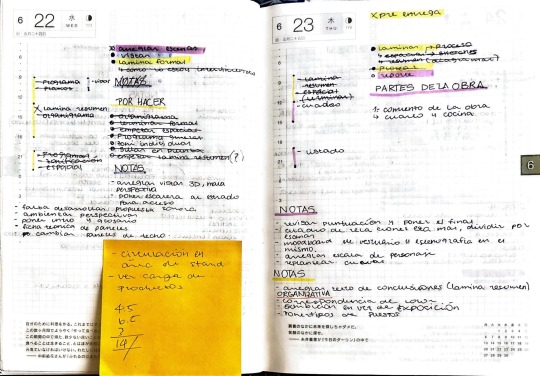

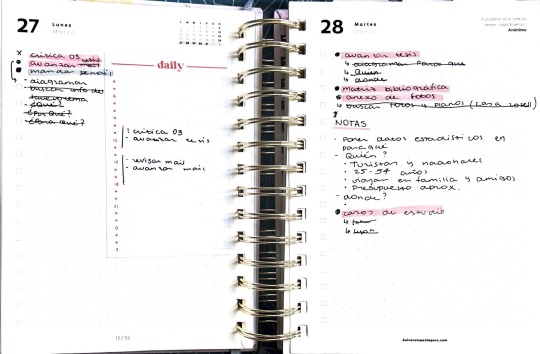

years in planners
Found my old Hobonichi Techo and decided to scan my favourite pages from the last 3 years in planners. From my third year of uni till the last one, 2021-2023. Starting with my 2021 bullet journal and ending on this year’s planner/filofax
#studyblr#studygram#studying#studyspo#mine#study#studymotivation#student#university#studyday#bulletjounaladdict#bulletjournal#bullet journal#bujo#planner#filofax#student life#organization
378 notes
·
View notes
Text

Good morning, StudyBlrs.
EXAM DAY:
I woke up early today to revise some questions that might be asked in my surgery exam. I go to classes and I try to understand what the teacher is focusing on more. I always ask questions. I will let you know how it went.
I had no coffee today because I have noticed that on exam days I already have my adrenaline and energy up. So, I had a cup of tea and my banana for snack two hours after my proper breakfast.
@studywith-hada made this cool study with me video and I have used it today. So cool.
TODAY:
I decided to start my day with Neurophysiology.
I made a three tasks list and I will be using (as usual) my Korean study tracking.
Let's do this!


Have a blessed and productive week! :)
Iveth🌻
#she studies medicine#medical studyblr#studyblr#studyblr community#study blog#medical student#studystudystudy#100 days of efficient productivity challenge#studyspo#studygram#study#studying#study motivation#study notes#study tips#organization
341 notes
·
View notes
Text
Hi everyone
I just thought I would share this resources because it is mind blowing.
youtube
This girl has ADHD and talked about how she has always struggled with time blocking and keeping a calendar. She created a new method that works better for her.
Instead of having different coloured colours calendar for different areas of your life and then struggling to know what to do with events that belong to multiple areas. It works by having different colours for each calendar that helps you prioritise tasks. I myself have a hard time deciding what's important.
I have outlined my modified calendars that make sense for me but check out the video for hers.
Appointments
This calendar is for time sensitive things that have be done and/or would have a negative impact on others if you don't follow through. These can't be moved or would be really difficult to move.
Examples: actual appointments, work shifts, classes, scheduled group rehearsals/trainings, someone's birthday dinner/party
Bottlenecks
This calendar is for things that don't need to be done AT a specific time but do need to be done BY a specific time. This means they can be moved around whenever before the deadline but need to be done before the deadline otherwise they create a bottleneck in your schedule and lead to you getting overwhelmed.
Example: homework, taking the bins out, paying bills, filming youtube videos
Critical (yellow)
This calendar is for things that you deem critical to your goals and growth. These can be moved around if needed but are things you want to try your best to get done each day.
Examples: workouts, reading 10 pages of a book, doing a full skincare routine
Daily Routine
This calendar is for parts of your day that happen regularly. These can be moved around where needed.
Examples: habits, chores, meals, travel time
Extra Fancy
This calendar is for extra fancy stuff that your ideal self would like to get done. These are nice to do or want to do but nothing bad will happen if you don't do them.
Examples: doing a facemask, watching a movie, doing some arts and crafts
Favourable Rememberables
This calendar is for things that you need to remember in the future.
Examples: birthdays, days off, due dates (I recommend creating separate events for submitting assessments or paying the bill and put them as appointments which are your top priority)
I hope this can be useful to someone because I think it will have a big difference for me. 💗
#adhd#time management#studyblr#executive dysfunction#adhd brain#neurodiverse stuff#adhd problems#adult adhd#adhd things#adhd stuff#actually adhd#organization#organisation#planner#planning#scheduled#school#university#adulting#study motivation#google calendar#calendar#study tips#life hacks#college#procrastination#Youtube
781 notes
·
View notes
Photo
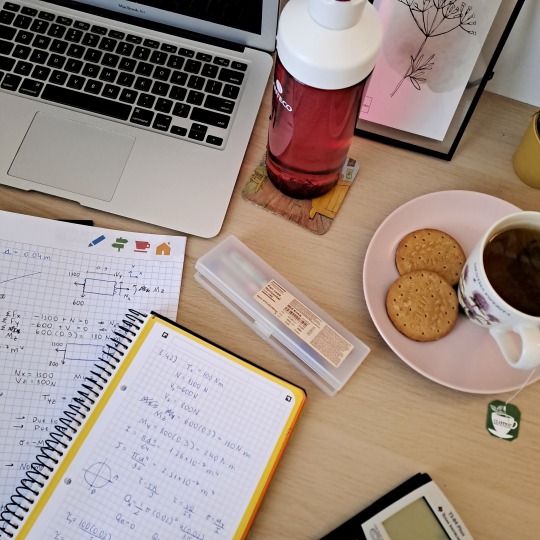

22nd March: I've fallen into the trap of getting a shoulder bag for uni because they look cute, but despite the shoulder pain, at least everything fits :')
1K notes
·
View notes
Text

A.2.6 Why is solidarity important to anarchists?
Solidarity, or mutual aid, is a key idea of anarchism. It is the link between the individual and society, the means by which individuals can work together to meet their common interests in an environment that supports and nurtures both liberty and equality. For anarchists, mutual aid is a fundamental feature of human life, a source of both strength and happiness and a fundamental requirement for a fully human existence.
Erich Fromm, noted psychologist and socialist humanist, points out that the “human desire to experience union with others is rooted in the specific conditions of existence that characterise the human species and is one of the strongest motivations of human behaviour.” [To Be or To Have, p.107]
Therefore anarchists consider the desire to form “unions” (to use Max Stirner’s term) with other people to be a natural need. These unions, or associations, must be based on equality and individuality in order to be fully satisfying to those who join them — i.e. they must be organised in an anarchist manner, i.e. voluntary, decentralised, and non-hierarchical.
Solidarity — co-operation between individuals — is necessary for life and is far from a denial of liberty. Solidarity, observed Errico Malatesta, “is the only environment in which Man can express his personality and achieve his optimum development and enjoy the greatest possible wellbeing.” This “coming together of individuals for the wellbeing of all, and of all for the wellbeing of each,” results in “the freedom of each not being limited by, but complemented — indeed finding the necessary raison d’etre in — the freedom of others.” [Anarchy, p. 29] In other words, solidarity and co-operation means treating each other as equals, refusing to treat others as means to an end and creating relationships which support freedom for all rather than a few dominating the many. Emma Goldman reiterated this theme, noting “what wonderful results this unique force of man’s individuality has achieved when strengthened by co-operation with other individualities . .. co-operation — as opposed to internecine strife and struggle — has worked for the survival and evolution of the species… . only mutual aid and voluntary co-operation … can create the basis for a free individual and associational life.” [Red Emma Speaks, p. 118]
Solidarity means associating together as equals in order to satisfy our common interests and needs. Forms of association not based on solidarity (i.e. those based on inequality) will crush the individuality of those subjected to them. As Ret Marut points out, liberty needs solidarity, the recognition of common interests:
“The most noble, pure and true love of mankind is the love of oneself. I want to be free! I hope to be happy! I want to appreciate all the beauties of the world. But my freedom is secured only when all other people around me are free. I can only be happy when all other people around me are happy. I can only be joyful when all the people I see and meet look at the world with joy-filled eyes. And only then can I eat my fill with pure enjoyment when I have the secure knowledge that other people, too, can eat their fill as I do. And for that reason it is a question of my own contentment, only of my own self, when I rebel against every danger which threatens my freedom and my happiness…” [Ret Marut (a.k.a. B. Traven), The BrickBurner magazine quoted by Karl S. Guthke, B. Traven: The life behind the legends, pp. 133–4]
To practice solidarity means that we recognise, as in the slogan of Industrial Workers of the World, that “an injury to one is an injury to all.” Solidarity, therefore, is the means to protect individuality and liberty and so is an expression of self-interest. As Alfie Kohn points out:
“when we think about co-operation… we tend to associate the concept with fuzzy-minded idealism… This may result from confusing co-operation with altruism… Structural co-operation defies the usual egoism/altruism dichotomy. It sets things up so that by helping you I am helping myself at the same time. Even if my motive initially may have been selfish, our fates now are linked. We sink or swim together. Co-operation is a shrewd and highly successful strategy — a pragmatic choice that gets things done at work and at school even more effectively than competition does… There is also good evidence that co-operation is more conductive to psychological health and to liking one another.” [No Contest: The Case Against Competition, p. 7]
And, within a hierarchical society, solidarity is important not only because of the satisfaction it gives us, but also because it is necessary to resist those in power. Malatesta’s words are relevant here:
“the oppressed masses who have never completely resigned themselves to oppress and poverty, and who … show themselves thirsting for justice, freedom and wellbeing, are beginning to understand that they will not be able to achieve their emancipation except by union and solidarity with all the oppressed, with the exploited everywhere in the world.” [Anarchy, p. 33]
By standing together, we can increase our strength and get what we want. Eventually, by organising into groups, we can start to manage our own collective affairs together and so replace the boss once and for all. ”Unions will… multiply the individual’s means and secure his assailed property.” [Max Stirner, The Ego and Its Own, p. 258] By acting in solidarity, we can also replace the current system with one more to our liking: “in union there is strength.” [Alexander Berkman, What is Anarchism?, p. 74]
Solidarity is thus the means by which we can obtain and ensure our own freedom. We agree to work together so that we will not have to work for another. By agreeing to share with each other we increase our options so that we may enjoy more, not less. Mutual aid is in my self-interest — that is, I see that it is to my advantage to reach agreements with others based on mutual respect and social equality; for if I dominate someone, this means that the conditions exist which allow domination, and so in all probability I too will be dominated in turn.
As Max Stirner saw, solidarity is the means by which we ensure that our liberty is strengthened and defended from those in power who want to rule us: “Do you yourself count for nothing then?”, he asks. “Are you bound to let anyone do anything he wants to you? Defend yourself and no one will touch you. If millions of people are behind you, supporting you, then you are a formidable force and you will win without difficulty.” [quoted in Luigi Galleani’s The End of Anarchism?, p. 79 — different translation in The Ego and Its Own, p. 197]
Solidarity, therefore, is important to anarchists because it is the means by which liberty can be created and defended against power. Solidarity is strength and a product of our nature as social beings. However, solidarity should not be confused with “herdism,” which implies passively following a leader. In order to be effective, solidarity must be created by free people, co-operating together as equals. The “big WE” is not solidarity, although the desire for “herdism” is a product of our need for solidarity and union. It is a “solidarity” corrupted by hierarchical society, in which people are conditioned to blindly obey leaders.
#faq#anarchy faq#revolution#anarchism#daily posts#communism#anti capitalist#anti capitalism#late stage capitalism#organization#grassroots#grass roots#anarchists#libraries#leftism#social issues#economy#economics#climate change#climate crisis#climate#ecology#anarchy works#environmentalism#environment#solarpunk#anti colonialism#mutual aid#cops#police
34 notes
·
View notes
Text
How To Plan Your Day 🌒📝💡✨
Start the night before. What do you need to do tomorrow to meet your needs? Write down the most important tasks you want to complete the next day. This gives you a clear starting point in the morning.
Create a morning routine that is focused on your well being. Exercise, meditate, read etc.
Make a list of all the things you need to do. Put the most important things at the top of the list.
Divide your day into chunks of time. Decide when you'll do each task.
Estimate the time it will take you to complete each task.
If a big task seems too hard, break it into smaller steps.
Batch the similar tasks together for maximum efficiency.
Try to do one thing at a time. Multitasking might not help you get things done better.
Don't plan too many things. Only plan what you can really do.
Check your progress during the day. Change your plans if things are not going as expected.
At the end of the day, think about what you did and what's left. Learn from what went well and what didn't.
Finish each day with a quick clean up. What can do you now to set up your spaces and routines for both self care and efficiency.
Choose what you'll wear the next day, including clothes, shoes, and accessories. This saves you time in the morning and helps you avoid last-minute outfit decisions.
If you have to take things with you (like a work bag or gym bag), pack it with everything you need. This prevents you from rushing around in the morning to gather your things.
Lay out items you'll need in the morning, like your keys, wallet, or important papers. This way, you won't have to search for them when you're in a rush.
Take some time to wind down before bed. Read a book, practice some light stretching, or do something relaxing to help you sleep better.
Charge your phone, tablet, or laptop overnight so you start the day with fully charged devices.
Set your alarm for the time you want to wake up. Having a consistent wake-up time helps regulate your body clock.
Try to avoid looking at screens (phones, tablets, computers) at least an hour before bed. The blue light from screens can interfere with sleep.
Take a moment to reflect on the day and think about what you're looking forward to tomorrow. Visualizing a positive morning can help set a good tone for the next day.
Pick a weekly prep day and clean the house, meal prep, review your calendar and to do list for the week ahead.
#personal improvement#personal development#personal growth#morning routine#night time routine#planning#organization#glow up tips#self reflection#self development#self help#self improvement#selfimprovement#self care#it girl#clean girl#dream girl#girlblogging#dream girl journey#dream girl tips#advice#level up journey#goals
2K notes
·
View notes
Text
restocking and replenishing⋆.ೃ࿔*:・✍🏽

im making this post cuz i think its helpful to keep track of what u normally need and normally buy + how long it lasts u until it needs to be replaced.

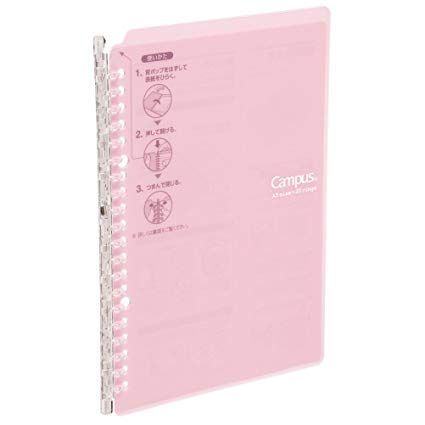
i separate mine weekly/monthly depending on what it is that i need, but by creating a sort of system like this u can save a lot of time when u go shopping, plus it'll bring ur organization to the next level.
HOW TO DO IT ;
so get some paper (preferably graphed paper, simply bcuz i find it neater and more aesthetically pleasing) and on one side write weekly and on the other side write monthly.
remember to use scented glitter gel pens and have FUN, make little doodles on the sides and decorate it with stickers when ur done.
on the weekly side write out what u need on a weekly basis. for example one thing on the weekly side of my list is sheet masks cuz i use them 1-2x a week.
use bullet points so that then everything is concise and easy to read, also when u go and buy them make sure to write the prices of those items, then u can use that data if u have other charts or lists ✨
on the monthly side write out what u need on a monthly basis. for example one thing on the monthly side of my list are my vitamins and my chlorophyll droplets.
DESIGNATE A DAY ;
have a designated day when u usually go and get whatever is on ur restock and replenish list. have some fun with it and make it a tradition of sorts even.
ur designated day should preferably be before ur week/month starts so that then u are fully equipped with what u need to feel and perform at ur best
my designated day is USUALLY saturdays and on my restock and replenish days i always have a kombucha and treat myself to something else that i want.
#honeytonedhottie⭐️#it girl#becoming that girl#self concept#self care#self love#that girl#it girl energy#dream girl#dream girl tips#dream life#organization#organization tips#self improvement#self reflection#self development#finance#tracking#lists#hyper femininity#girly#girl blogging#girl blog#romanticize
191 notes
·
View notes
Text
My Notion homepage
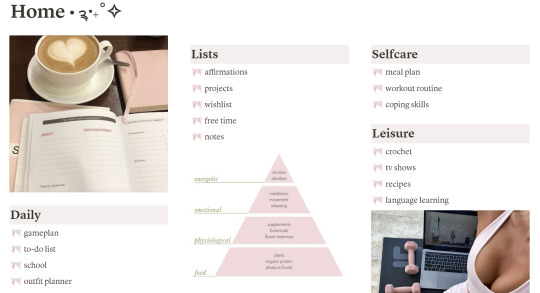

I think it looks so cute <3
#notion#homepage#inspo#aesthetic#idea#cinnamon girl#clean girl#dream girl#pink pilates girl#pinterest#pinterest girl#self healing#self love#self care#self improvement#organization#girly girl#that girl#it girl#girlblog#green juice girl#just girly things#girlblogging#girlblogger#feminine energy#hyper feminine#soft feminine#feminine journey#pink blog#pink pilates princess
644 notes
·
View notes
Text
𝖽𝖾𝗌𝖼𝗋𝗂𝗉𝗍𝗂𝗈𝗇 ͏͏͏ ͏͏͏ ͏͏͏ ͏͏͏ ͏͏͏ ͏͏͏ 𝗍𝗎𝗆𝖻𝗅𝗋 ͏͏͏ ͏͏͏ ͏͏͏ ͏͏͏ ͏͏͏ ͏͏͏ ͏͏͏ ͏͏͏ ͏͏͏ ͏͏͏ ͏͏͏ ͏͏͏ ͏͏͏ ͏͏͏ ͏͏͏ ͏͏͏ ͏͏͏ ͏͏͏ ͏͏͏ ͏͏͏ 𝗢𝟯
͏͏͏ ͏͏͏ ͏͏͏ ͏͏͏ ͏͏͏ ͏͏͏ ͏͏͏ ͏͏͏
͏ ͏ ͏ ͏ ͏ ͏ ͏ ͏ ͏ ͏ ͏ ͏ ͏ ͏ ͏ ͏ ͏ ͏ ͏ ͏ ͏ ͏ ͏ ͏ ͏𝐢.ᅠᅠ ͏ ͏ ͏𝗉𝗂𝗇𝗍𝖾𝗋𝖾𝗌𝗍 ͏ ͏ ͏ ͏ ͏ ͏ ͏ ͏ ͏ ͏ ͏ ͏· ͏ ͏ ͏ ͏ ͏ ͏ ͏ ͏ ͏ ͏ ͏ ͏ ͏ ͏ ͏ ͏ ͏ ͏ ͏ ͏ ͏ ͏ ͏ ͏𝗌𝗉𝗈𝗍𝗂𝖿𝗒 ͏ ͏ ͏ ͏ ͏ ͏ ͏ ͏ ͏ ͏二 ͏ ͏ ͏ ͏ ͏ ͏ ͏ ͏ ͏ ͏ ͏ ͏𝗍𝗐𝗂𝗍𝗍𝖾𝗋
͏͏͏ ͏͏͏ ͏͏͏ ͏͏͏ ͏͏͏ ͏͏͏ ͏͏͏ ͏͏͏
͏ ͏ ͏ ͏ ͏ ͏ ͏ ͏ ͏ ͏ ͏ ͏ ͏ ͏ ͏ ͏ ͏ ͏͏ ͏ ͏ ͏𝐬𝐞𝐫𝐢𝐨𝐮𝐬 ͏ ͏ ͏ ͏ ͏ ͏𓈈 𝖼𝗈𝗎𝗇𝗍𝖾𝗇𝖺𝗇𝖼𝖾 ͏ ͏ ͏ ͏ ͏ ͏ ͏ ͏ ͏ ͏ ͏ ͏ ͏ ͏ ͏ ͏ ͏ ͏ ͏ ͏ ͏ ͏ ͏ ͏ ͏ ͏ ͏ ͏ ͏ ͏ ͏ ͏ ͏ ͏ ͏ ͏ ͏͏͏͏𝗈𝖿 ͏ ͏ ͏ ͏ ͏ ͏𝗍𝗋𝖾𝖾𝗌 ͏ ͏ ͏ ͏ ͏ ͏𝗂𝗇 ͏ ͏ ͏ ͏ ͏ ͏❀ ͏ ͏ ͏ ͏ ׄ ͏ ͏ 𝘀𝗽𝗿𝗶𝗻𝗴 ͏ ͏ ͏ ͏ ͏ ͏ ͏ ͏ ͏ ͏ ͏ ͏ ͏ ͏ ͏ ͏ ͏ ͏𝒘𝒂𝒓𝒎𝒔 ͏ ͏ ͏ ͏ ͏ ͏ ͏𝗆𝖾 ͏ ͏ ͏ ͏ ͏ ͏ ͏ ͏ ͏ ͏𝖾𝗅𝗌𝖾 ͏ ͏ ͏ ͏ ͏ ͏♡

𝖽𝖾𝗌𝖼𝗋𝗂𝗉𝗍𝗂𝗈𝗇 ͏͏͏ ͏͏͏ ͏͏͏ ͏͏͏ ͏͏͏ ͏͏͏ 𝗍𝗎𝗆𝖻𝗅𝗋 ͏͏͏ ͏͏͏ ͏͏͏ ͏͏͏ ͏͏͏ ͏͏͏ ͏͏͏ ͏͏͏ ͏͏͏ ͏͏͏ ͏͏͏ ͏͏͏ ͏͏͏ ͏͏͏ ͏͏͏ ͏͏͏ ͏͏͏ ͏͏͏ ͏͏͏ ͏͏͏ 𝗢𝟰
͏͏͏ ͏͏͏ ͏͏͏ ͏͏͏ ͏͏͏ ͏͏͏ ͏͏͏ ͏͏͏
͏͏͏ ͏͏͏ ͏͏͏ ͏͏͏ ͏͏͏ ͏͏͏ ͏͏͏ ͏͏͏ ͏͏͏ ͏͏͏ ͏͏͏ ͏͏͏ ͏͏͏ ͏͏͏ ͏͏͏𝗐𝖾 ͏͏͏ ͏͏͏ ͏͏͏ ͏͏͏ ͏͏͏ ͏͏͏𝖼𝖺𝗇 ͏͏͏ ͏͏͏ ͏͏͏ ͏͏͏ ͏͏͏ ͏͏͏𝗌𝗍𝗂𝗅𝗅 ͏͏͏ ͏͏͏ ͏͏͏ ͏͏͏ ͏͏͏ ͏͏͏𝗆𝖾𝖾𝗍 ͏͏͏ ͏͏͏ ͏͏͏ ͏͏͏ ͏͏͏ ͏͏͏? ͏͏͏ ͏͏͏ ͏͏͏ ͏͏͏ ͏͏͏ ͏͏͏ ͏͏͏ ͏͏͏ ͏͏͏ ͏͏͏ ͏͏͏ ͏͏͏ ͏͏͏ ͏͏͏ ͏͏͏𝖾𝗇𝗍𝗂𝗍𝗅𝖾𝖽 ͏͏͏ ͏͏͏ ͏͏͏ ͏͏͏ ͏͏͏ ͏͏͏𝗍𝗈 ͏͏͏ ͏͏͏ ͏͏͏ ͏͏͏ ͏͏͏ ͏͏͏ ͏͏͏ ͏͏͏ ͏͏͏♡. ͏͏͏ ͏͏͏ ͏͏͏ ͏͏͏ ͏͏͏ ͏͏͏ ͏͏͏ ͏͏͏𝗄𝗂𝗌𝗌𝖾𝗌
͏͏͏ ͏͏͏ ͏͏͏ ͏͏͏ ͏͏͏ ͏͏͏ ͏͏͏ ͏͏͏
͏͏͏ ͏͏͏ ͏͏͏ ͏͏͏ ͏͏͏ ͏͏͏ ͏͏͏ ͏͏͏ ͏͏͏ ͏͏͏ ͏͏͏͏͏͏𝐬𝐨𝐟𝐭 ͏͏͏ ͏͏͏ ͏͏͏ ͏͏͏ 𝗌𝖼𝖾𝗇𝗍 ͏͏͏ ͏͏͏ ͏͏͏ ͏͏͏ 𝗈𝑓 ͏͏͏ ͏͏͏ ͏͏͏ ͏͏͏ 𝖿𝗅𝗈𝗐𝖾𝗋𝗌 ͏͏͏ ͏͏͏ ͏͏͏ ͏͏͏ ͏͏͏✿ ͏͏͏ ͏͏͏ ͏͏͏ ͏͏͏ 𝗂𝗇 ͏͏͏ ͏͏͏ ͏͏͏ ͏͏͏ 𝗍𝗁𝖾 ͏͏͏ ͏͏͏ ͏͏͏ ͏͏͏ ͏͏͏ ͏͏͏ ͏͏͏ ͏͏͏ ͏͏͏ ͏͏͏ ͏͏͏ ͏͏͏ ͏͏͏ ͏͏͏ ͏͏͏ ͏͏͏ ͏͏͏ ͏͏͏ 𝗅𝖾𝗍𝗍𝖾𝗋𝗌 ͏͏͏ ͏͏͏ ͏͏͏ ͏͏͏ 𝗄𝗂𝗌𝗌𝖾𝖽 ͏͏͏ ͏͏͏ ͏͏͏ ͏͏͏ ͏͏͏ ͏͏͏ 𝖻𝗒 ͏͏͏ ͏͏͏ ͏͏͏ ͏͏͏ ͏͏͏ ͏͏͏ 𝐦𝐞 ͏͏͏ ͏͏͏
͏ ͏ ͏ ͏ ͏ ͏ ͏ ͏ ͏ ͏ ͏ ͏ ͏ ͏ ͏ ͏ ͏ ͏
𝖼𝗋𝖾𝖽𝗂𝗍𝗌 𝗍𝗈 𝗆𝖾 𝗂𝖿 𝗒𝗈𝗎 𝗎𝗌𝖾 𝗂𝗍.
#͏ ͏͏͏ ͏͏͏ ͏͏͏ ͏͏͏ ͏͏͏ ͏͏͏ ͏͏͏ ͏͏͏ ͏͏͏ ͏͏͏ ͏͏͏ ͏͏͏ ͏͏͏ ͏͏͏ ͏͏͏ ͏͏͏ ͏͏͏ ͏͏͏ ͏͏͏ ͏͏͏ ͏͏͏ ͏͏͏ ͏͏͏ ͏͏͏ ͏͏͏ ͏͏͏ ͏͏͏ ͏͏͏ ͏͏͏ ͏͏#messy bios#bios#random bios#bios random#symbolos#short bios#long bios#tumblr help#tumblr bios#organization#cute bios#simple bios#pinneds#kpop long bios#twitter long locs
1K notes
·
View notes
Text
"You know I've always wanted a paperless office--"
"Yes, Archchancellor, that's why you hide it all in cupboards and throw it out of the window at night."
"Clean desk, clean mind," said the Archchancellor.
Terry Pratchett, The Truth
#mustrum ridcully#the bursar#the truth#discworld#terry pratchett#coworkers#organization#paperwork#paperless#avoidance#paperlessoffice#clean desk clean mind#the mustrum ridcully school of management
170 notes
·
View notes
